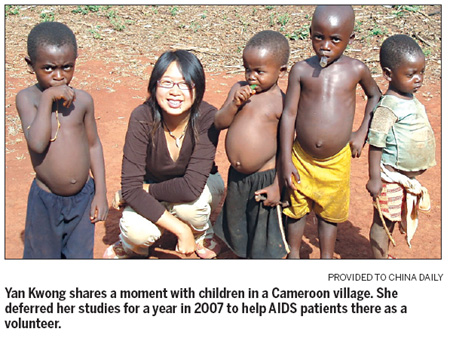Med student finds meaning in work with African AIDS victims
Updated: 2010-04-09 07:34
By Ming Yeung(HK Edition)
|
|||||||||

Many people become volunteers to help the needy in their spare time, but not many are willing to sacrifice their studies or careers for a full year to help people on the other side of the world. Yan Kwong, in her last year of studies as an undergraduate medical student at the Chinese University of Hong Kong, took a year off from her studies in 2007, to work in Cameroon helping children with AIDS.
About 5.5 percent of the population of the Republic of Cameroon is infected with AIDS, including babies who have inherited the condition from their parents.
Yan became an avid volunteer during secondary school. She decided the only way she could offer help to people in Cameroon was to take a year off. The NAVTI Foundation, a local NGO actively supporting orphans and helpless children, helped her realize her dream of helping out in a faraway place.
Most of the funding allocated to help ease the suffering of AIDS victims in Africa is swallowed up by corruption, so it is the charities that provide the real help for sufferers.
"Nutrition is more in need than medication for AIDS patients, and charities provide nutritious food for them," Yan says.
Poor living condition and inadequate food supplies were the conditions Yan anticipated but what she had not expected was the terror of having a soldier point a rifle at her when she was caught in the midst of a riot. She came down with malaria twice during her stay in Kumbo, a northwestern village of Cameroon. The trials, however, would not deter her from becoming a medical volunteer in the future, she said.
Her voluntary work focused on three areas - school sponsorship for orphans, AIDS prevention education and medical staff training. "Many children stay at home due to the lack of funding for schooling, and this only exacerbates the poverty," Yan notes. "For that reason, I collected donations to pay their tuition fees." Through her persuasion, Yan collected HK$35,000 for a year's tuition fees for 140 orphans.
As Yan observes, the poverty problem in Africa is deeply rooted in the spread of AIDS, which is brought about largely by unprotected sex. "We all know prevention is better than cure. I thus went to secondary schools to teach students how to prevent AIDS," she says. Teenagers easily fall prey to the risk of unsafe sex, she said. In a survey conducted among more than 1,000 students, she found it striking that students were generally ignorant of AIDS. "Some still believe AIDS can be cured by medication," she adds. The local teachers discourage students from using condoms because they believe teaching the use of condoms encourages kids to have sex. In contrast, Yan sees greater importance in promoting safe sex since it is difficult to prevent young people from engaging in sexual activity.
There is no hospital in the village. The locals established a nurse training school to train young ladies to take care of the sick. Some of the nurses are AIDS patients who had been suffering low self-esteem before their training. "Doctors should not just physically cure patients, but psychologically as well," Yan observes. Through training, these nurses realize their value by helping others.
Yan recalls that she almost gave up in the first few months because of the lack of daily necessities such as water and electricity. She endured the hardship because she realized that local people lived under the same constraints. She says her experience was uplifting and life affirming, adding, "Hong Kong people complain about trivial matters. But if they knew the poor living standard in Africa personally, they would not do that."
China Daily
(HK Edition 04/09/2010 page1)